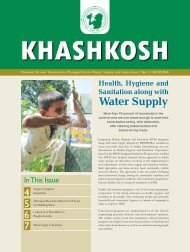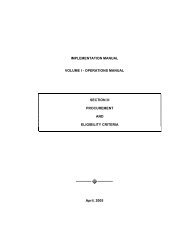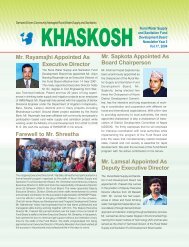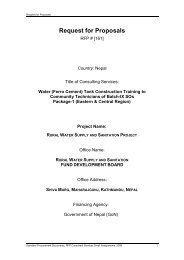ANNUAL REPORT_2008.pdf - Rural Water Supply and Sanitation ...
ANNUAL REPORT_2008.pdf - Rural Water Supply and Sanitation ...
ANNUAL REPORT_2008.pdf - Rural Water Supply and Sanitation ...
Create successful ePaper yourself
Turn your PDF publications into a flip-book with our unique Google optimized e-Paper software.
Piloting Jagaran Karyakram<br />
in the Pilot Schemes<br />
<br />
<br />
<br />
<br />
<br />
<br />
Orientation to the SOs of the scheme by FCB<br />
Intensified activities to be undertaken in the Pilot<br />
Schemes of Batch-VII - representatives from all five<br />
regions through 25 trained Para-professionals.<br />
One Scheme is allocated to each 25 Para-professional<br />
The tasks in each scheme include: Jagaran<br />
Sensitisation; formation of Jagaran Samiti; training<br />
to Jagaran Samiti members; conducting community<br />
score cards; conducting process audit <strong>and</strong><br />
documentation of the activities.<br />
Cross Learning Session<br />
Four Schemes will be allocated to each Paraprofessional<br />
Overall Jagaran Karyakram<br />
Aspects<br />
<br />
<br />
<br />
<br />
Jagaran Karyakram Mobilisation: To have active<br />
mobilisation of community <strong>and</strong> village level<br />
intuitions an initial sensitisation on Jagaran Karyakram<br />
will be undertaken through Para-professional in<br />
pilot scheme <strong>and</strong> through SOs in al other scheme .<br />
This will include mobilising the community to<br />
embrace the Jagaran Karyakram, underst<strong>and</strong> its<br />
significance <strong>and</strong> initiate activities for the same.<br />
Formation of Jagaran Samiti: Jagaran Samiti will<br />
be formed in the Sadharan Sabha in an inclusive<br />
manner having adequate representation of all<br />
stakeholders in the village as per the policy. The<br />
members will be given necessary orientation on<br />
the roles <strong>and</strong> responsibilities <strong>and</strong> accountability tools<br />
Orientation of SOs: The Jagaran Karyakramis<br />
planned to be initiated across the entire batch VII<br />
<strong>and</strong> subsequently the batch VIII schemes. In view<br />
of the same it would be necessary to involve the<br />
SOs in respective scheme for the general IEC <strong>and</strong><br />
orientation on the Jagaran Karyakram.<br />
Empowering the Para-professionals: Under the<br />
Jagaran Karyakrama village level cadre of Para<br />
Professionals are trained to internalise capacities<br />
for facilitating Jagaran activities. Their roles will be<br />
of facilitating the social accountability tools in the<br />
Jagaran villages initially in the pilot scheme <strong>and</strong><br />
subsequently as service providers to other villages.<br />
Coordination, Linkage<br />
Development <strong>and</strong><br />
Partnership<br />
Building<br />
T<br />
he vertical <strong>and</strong> horizontal coordination<br />
<strong>and</strong> relation with National Planning<br />
Commission, concerned ministries/<br />
departments, stakeholders <strong>and</strong> IDA/World Bank, <strong>and</strong> other<br />
concerned donors working in water supply <strong>and</strong> sanitation at<br />
the centre are essential for policy matters <strong>and</strong> for ensuring<br />
smooth running of the program. Similarly, coordination at<br />
the local level with DDCs, VDCs, Line Agencies, I/NGOs,<br />
Political Parties, CBOs, WUSGs <strong>and</strong> other stakeholders<br />
including communities is prerequisite for avoiding duplication<br />
<strong>and</strong> adopting cost sharing of the programs <strong>and</strong> making a<br />
favourable environment <strong>and</strong> smooth implementation of the<br />
Board’s program in rural areas of the country. The Board<br />
itself is at the centre <strong>and</strong> SOs as representatives of the Board<br />
to coordinate district level program activities <strong>and</strong> establish<br />
rapport with local bodies.<br />
Regional workshop on strengthening coordination <strong>and</strong><br />
partnership building with local government has been<br />
organised with the participation from the representatives of<br />
Ministry of Local Development (MLD), Local Development<br />
Officers (de facto DDC Chairs) from District Development<br />
Committees (DDCs), Chief of District Technical Offices,<br />
representatives from Association of DDCs in Nepal (ADDC/<br />
N) <strong>and</strong> National Association of VDCs in Nepal (NAVIN),<br />
representatives from Support Organisations (SOs) <strong>and</strong> Service<br />
Agencies (SAs) were held in Kathm<strong>and</strong>u (25 th Sept) for Eastern<br />
<strong>and</strong> Central Regions, in Pokhara (28 th Sept) for Western<br />
Region, <strong>and</strong> in Nepalganj (21 st Oct) for Mid <strong>and</strong> Far western<br />
Regions. Inputs are received in the areas of how the scheme<br />
cycle can be aligned with the planning process of the local<br />
bodies, possibilities of cost sharing in the schemes, possibilities<br />
for involving DDCs in compliance monitoring of the Board<br />
supported schemes <strong>and</strong> improving mechanisms for effective<br />
information sharing among the SOs, SAs, RWSSFDB <strong>and</strong> Local<br />
bodies (e.g. providing copies of contracts, overview of<br />
schemes in a particular district, sharing of approved plans<br />
<strong>and</strong> reports).<br />
26 · RWSSFDB Annual Report 2008



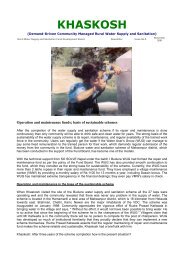
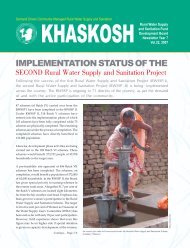
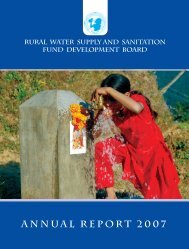
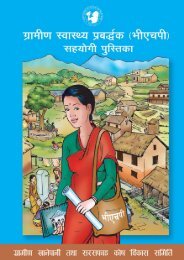

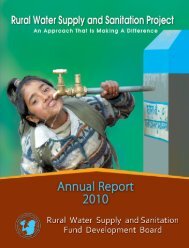
![vfg]k fgL tyf ;/;kmfOsf] If]qdf sf]if ljsf; ;ldltsf] cjwf/0ff pTs[i7 cEof](https://img.yumpu.com/38832733/1/190x245/vfgk-fgl-tyf-kmfosf-ifqdf-sfif-ljsf-ldltsf-cjwf-0ff-ptsi7-ceof.jpg?quality=85)

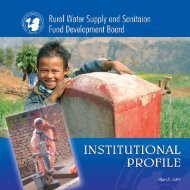
![Request for Proposals RFP # [162] - Rural Water Supply and ...](https://img.yumpu.com/38832347/1/184x260/request-for-proposals-rfp-162-rural-water-supply-and-.jpg?quality=85)
